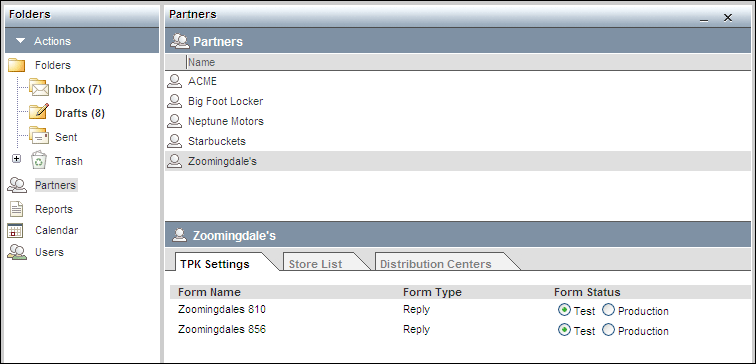Configuring TPKs
To ensure that you comply with the specific EDI requirements of your partners, Liaison will have developed one or more trading partner kits (TPKs) for you. A TPK consists of a template or group of templates that you use to create your EDI transactions for a specific trading partner. For example, if you need to send invoices and advance ship notices to Zoomingdale's, you need a trading partner kit with invoice and advance ship notice templates that conform to Zoomingdale's EDI specifications (also known as implementation conventions). You will have a separate TPK for each EDI trading partner with whom you exchange EDI documents via Liaison Athena.
TPKs are viewed and configured from the Partners folder. Opening this folder displays all the TPKs that have been set up for your Athena account, as shown in the next graphic.
When you click on a trading partner name in the upper pane, the bottom pane displays which outbound transactions are available for creation. In the previous graphic, we see that the Zoomingdale's partner has two programmed outbound transactions: an 810 and 856. These are the only possible Zoomingdale's documents that you will be able to create using Athena. If your partner notifies you that an additional EDI transaction is required, then you should contact Liaison and we can provide you with a time estimate and quote for the requested transaction.
You can receive any document from your partners. You don’t need to notify Liaison if a partner is planning on sending you new transaction types. Only outbound transactions (i.e. those that you create from Athena) require development. Athena can receive any compliant EDI document and render it in attractive HTML without any additional programming.
Although the TPKs found in your Athena mailbox are turnkey (i.e. there's no programming you need to do in order to get them working), it is important that you make sure your TPKs are in the appropriate test/production mode as you move through initial testing with your trading partners. In addition, depending on the nature of the relationship you have with your trading partner, you have the opportunity to maintain store list information within your TPK settings. To learn more about these TPK configurations, explore the following links: